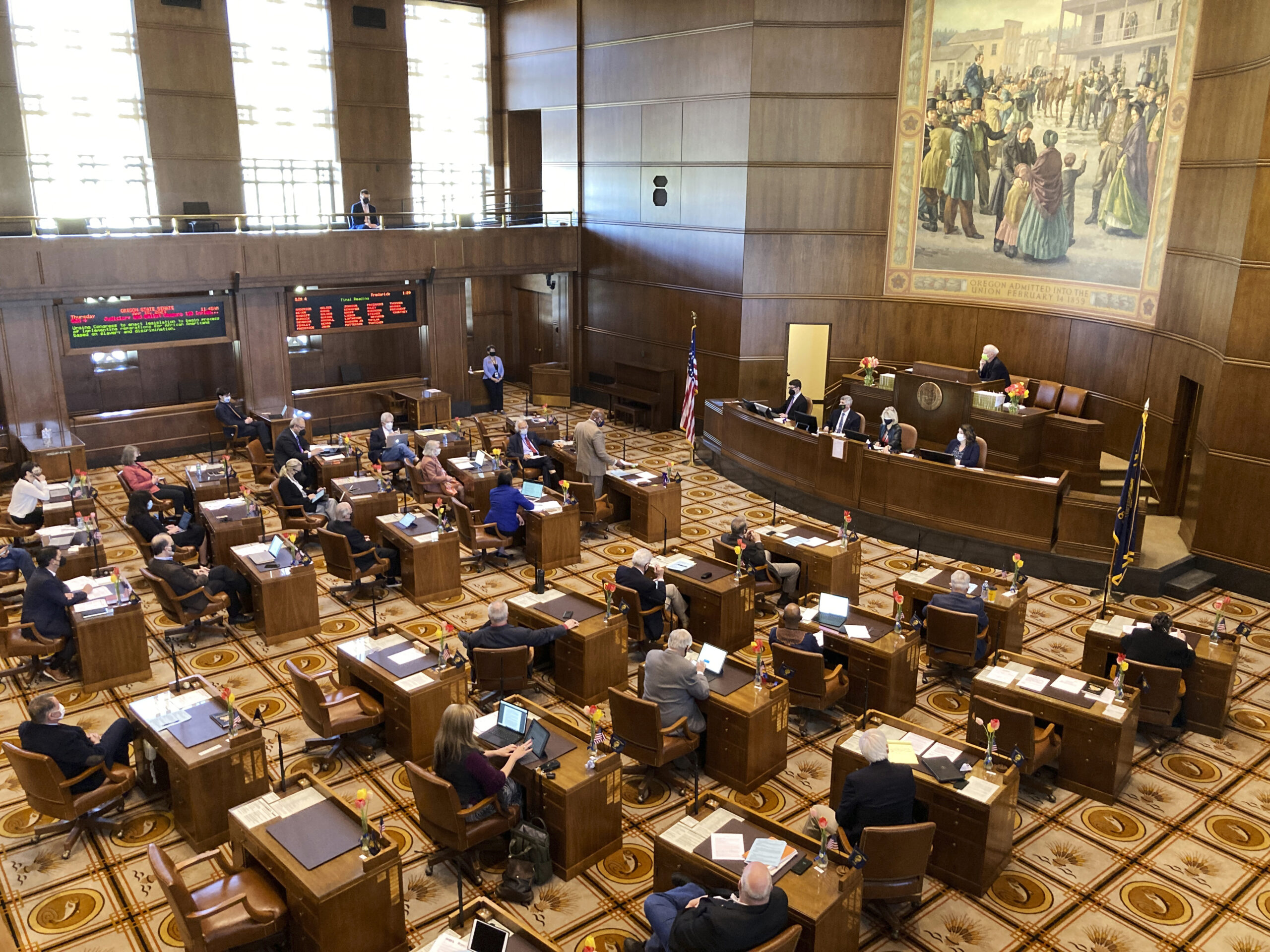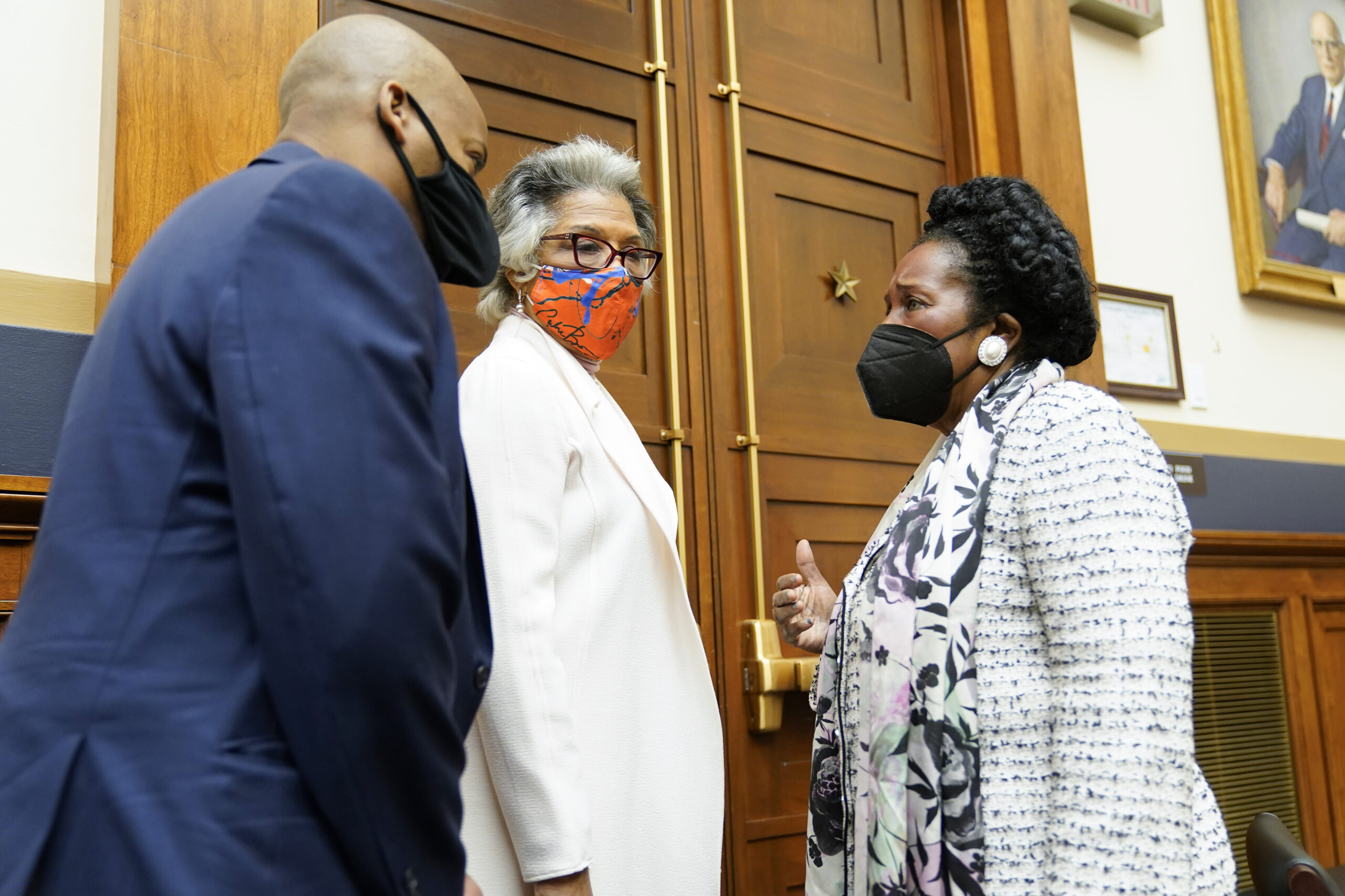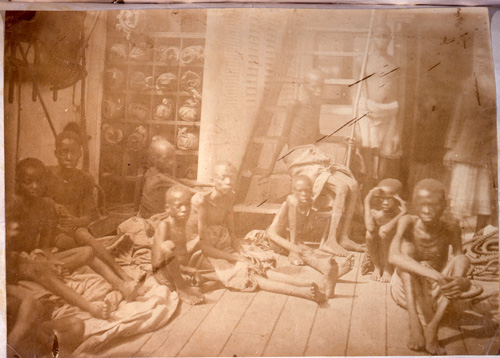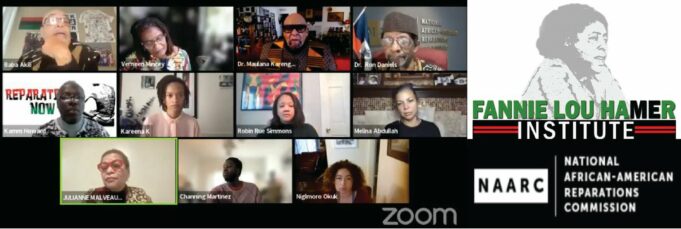Directing attention to the historic promise of “forty acres and a mule,” plus interest, and reintroducing higher levels of engagement to a younger generation of activists, the reparations movement for the descendants of enslaved Africans is expanding to new dimensions through the power of information, unity and demands for justice on the state, federal and local levels.
Noting the trans-generational damage inflicted by 400 plus years of chattel slavery, Black Codes, Jim Crow laws, and anti-Black discrimination imposed through unjust government policies, the Fannie Lou Hamer Institute, on January 29, hosted a community and town hall meeting: “Reparations Beyond Equity.”

The forum was livestreamed through various online and social media platforms. Moderated by Black Lives Matter-Los Angeles organizer Baba Akili, the California based-event featured activists, researchers, economists, and elected officials seeking to define reparations within a modern context.
“It was not a question of was there any damage done during slavery, the question was: how much was done?” California Secretary of State Dr. Shirley Weber said during her introductory remarks. Dr. Weber was the author of Assembly Bill 3121 (AB 3121) while serving eight years as a member of the California State Assembly in the 79th Assembly District. The state bill was enacted September 30, 2020, establishing the “Task Force to Study and Develop Reparation Proposals for African Americans” through the California Department of Justice.
“It’s the first, really, state reparations bill, and I felt very strongly that California, being the fifth largest economy in the world, a Democratic state in which we had the votes to basically do this, that we could address (an) issue in California that was struggling on the national level,” the secretary of state explained.
Building on the national level what the late U.S. Representative John Conyers (D-Mich.) worked to introduce in 1989, H.R.40 Rep. Shelia Jackson Lee (D-Texas) is now sponsoring the amended bill that she introduced to the House Judiciary Committee on January 4, 2021, which is awaiting a floor vote. As worded, the revised bill is designed:
“To address the fundamental injustice, cruelty, brutality and inhumanity of slavery in the United States and the 13 American colonies between 1619 and 1865 and to establish a commission to study and consider a national apology and proposal for reparations for the institution of slavery, its subsequent de jure and de facto racial and economic discrimination against African Americans, and the impact of those forces on living African Americans, to make recommendations to the Congress on appropriate remedies, and for other purposes.”
Studies, allies and proposed remedies
Arguments both for and against reparations have encompassed solutions ranging from repatriation and resettlement to land grants, compensatory settlements, and even callous references to the benevolence of welfare payments leading many advocates of the movement to repackage their positions to the public.
“When I came into the movement, we were at a lull. The 2005 reparations lawsuit was just dismissed and that had let out a tremendous amount of air in the movement, but what we are seeing now is a tremendous amount of energy, and this energy is driven by two things,” said Kamm Howard, a Chicago businessman and National Co-Chair of the National Coalition of Blacks for Reparations in America (N’COBRA).
Mr. Howard is also author of the pamphlet “Laying the Foundation for Local Reparations: A Guide for Providing National Symmetry for Local Reparations Efforts,” and worked in leading the 2017 effort of rewriting Rep. Conyers’ original 1989 bill from that of a study to that of a remedy.

“So right now, we have two bills in Congress, H.R.40 and S.40, on the Senate side. And not since Reconstruction have we had two bills, (and) we have a tremendous amount of allies assisting our people and this push for reparations, the Japanese Americans, the Jewish Reform communities, and various communities that are non-Black are into this movement,” Mr. Howard said.
“Right now, we have over 215 Congresspersons in the House who have agreed to vote yes, over 196 are co-sponsors, the other have identified that they will offer yes votes if the bill makes it to the floor, we have about 20 or 22 co-sponsors in the Senate, so the bill has never been at this particular level in the history of this country,” he added.
Regarding the destruction of Black America’s economic infrastructure during the Post-Reconstruction period, and the ensuing wealth gap under Jim Crow segregation and Post-Civil Rights Era discrimination, economist, author and President Emerita of Bennett College for Women, Dr. Julianne Malveaux, explained that Black people’s ability to accumulate money for spending, saving, and investing, suffered deliberate legislative barriers imposed against them as a tool of oppression.
“In 1880, African American people had one dollar for every $36 White dollars (and) by 1910, that had dropped to one dollar per $16 White dollars. Today, it is one Black dollar for every $10 White dollars.” Dr. Malveaux said. “That means at some level, we made more progress between 1880 and 1910 than we’ve made now, why is that?” she asked. “It’s not because Black people are lazy or trifling or aren’t working, it’s because laws were passed.
I look at lynching, and I talk about it a lot in my work as economic envy, when people want to talk about lynching as Black men raping White women, that’s just a lie. Lynching was a means of economic coercion and when you see that, you see the loss of our land,” Dr, Malveaux said.
“Banks played a very complicit role. When we talk about money reparations, we have to talk about what banks owe, what banks have done, how they maximized their profits at Black people’s expense and even when we fast-forward to today, we don’t have the virulent, obvious extraction of our wealth, but we have our wealth extracted from us in other ways and our labor,” she added.
Morality, agendas, and models of self-help
Historians and scholars of indigenous societies point to the impact of colonization, enslavement and the intentional dismantling of a civilization’s folkways, languages and religions as forms of genocide. Dr. Maulana Karenga, founder of the annual seven-day Kwanzaa celebration and director of Africana Studies at California State University Long Beach, said he agrees that the struggle for reparations is of vital importance after 400 years of oppression.
“When we talk about this historical and cultural condition, we are inevitably led back to the holocaust of enslavement, a morally monstrous act of genocide that was not only against the people themselves, but also a crime against humanity,” Dr. Karenga said. “Amid the morally monstrous destruction of human life, human culture, and human possibility, (with) millions lost, destroyed in various ways, the second morally monstrous destruction of human culture, the destruction of literature, art, music, of cities and towns, of states and civilization and the people who made them, and then the morally monstrous destruction of possibility, lifting us out of our own history and making us a forgotten footnote and hidden casualty in European history and actually de-culturalizing us,” he said of the Europe’s and America’s crimes of omission and commission.
Regarding local communities in contemporary America, local efforts advancing reparation agendas in cities such as Evanston, Illinois, have brought together coalitions both for and against the methods and processes by which the nexus between justice and economics may be realized.
“This is not just about H.R.40, and the crimes against humanity as we know the trans-Atlantic slave trade and other policies that were enforced at a federal level, but there are specific municipal harms, state level harms, as we’re seeing now in the State of California, that are just as egregious and we moved forward with passing a reparation in line with harms specific in Evanston,”
Said Robin Rue Simmons, founder and director of First Repair, a not-for-profit reparations advocacy organization, and a retired Alderman formerly representing Evanston’s 5th Ward. “It won’t solve crimes against humanity, it’s absolutely not meant to, but it is a start in Evanston to address what’s happened in Evanston,” she said of her city’s local reparations initiative funded by the first $10 million in sales tax from adult use cannabis sales.
Several recent reparations forums and summits show the fight and conversation continues. During a three-day summit on reparations that took place at the Atlanta University Center and virtually via Zoom last November, experts discussed and strategized about reparations for Black descendants of slaves in the U.S.
The 2nd Annual National Reparations N’Daba/Summit organized by the National Reparations Institute took place Nov. 5-7. The objectives of the summit were to consolidate the movement, control the reparations narrative, implement the National Reparations Declaration and the Collective Culture Model and Methodology and make sure select committees were established.
Although the fight to repair the descendants of enslaved Africans has found renewed life in 21st century politics and activism, those long invested in the liberation struggle are both guarded and optimistic regarding policies and initiatives designed to correct current and historic wrongs.

Participants in that conference included members of the December 12th Movement, American Descendants of Slavery (ADOS), N’COBRA, the Malcolm X Grassroots Movement, New Order Human Rights Organization and Beacon Hill Black Alliance for Human Rights. Students from Clark Atlanta University and Morehouse College were also present.
The Honorable Elijah Muhammad, the Eternal Leader of the Nation of Islam, said he wanted Black people to have 8-10 states. Summit organizers at the N’Daba Summit considered 12 possible states for reparations, which they narrowed by looking at the chief products and the acreage of producing land.
The Nation of Islam in Europe also hosted virtual conference focused on reparations, repatriation, building safe, productive spaces for Black people and carving out our own destiny in Africa and the Caribbean. The forum, “Reparations, Europe! What do European Nations Owe and What Do We Owe Ourselves?” took place virtually last October.
“I want to say that I hope as an outcome of this conversation, that we will see a robust, reparations stakeholder driven initiative coming out of Los Angeles, as reparations is bubbling up all over the country as a result of the kind of work that Robin Rue Simmons is doing and has done in Evanston, Illinois,” said political scientist and Black activist Dr. Ron Daniels, convener of the National African American Reparations Commission (NAARC), during the Jan. 29 forum.
“There is no amount of money that actually can pay for the kind of holocaust of enslavement, as Dr. Karenga as well as Dr. Malveaux have talked about, but that does not mean that people are not entitled to what we call direct benefits,” Dr. Daniels added.
“But beyond that, how do you really repair community? How do you go back and recreate or deal with it in all of its dimensions, physical, spiritual, cultural of (Tulsa’s) Greenwood district? This requires community benefits and requires a larger concept of what we do collectively,” he said.
To view: “A Virtual Community Meeting & Townhall: Reparations Beyond Equity” in its entirety, visit Fannie Loui Hamer Institute on Facebook. Final Call staff contributed to this report.













